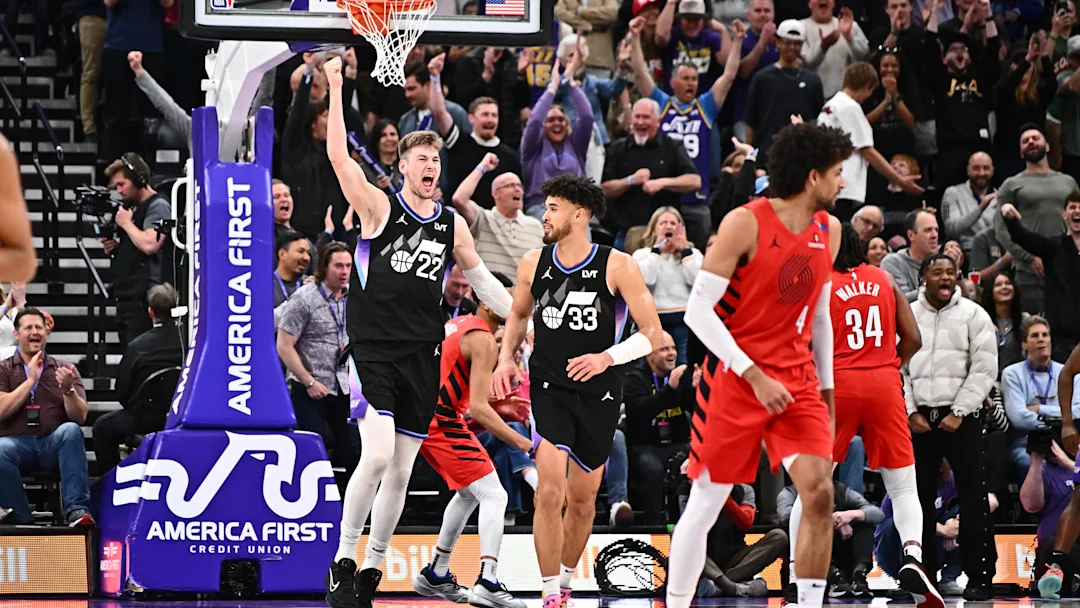Kyle Filipowski, a former Duke University standout, has made a significant impact in his rookie season with the Utah Jazz. Selected as the 32nd overall pick in the 2024 NBA Draft, Filipowski’s transition from college to the professional ranks has been marked by impressive performances and rapid development. This article delves into his journey, highlighting his collegiate achievements, rookie season milestones, and the factors contributing to his early success in the NBA.
Born on November 7, 2003, in Middletown, New York, Kyle Filipowski’s basketball journey began in his home state. He attended Minisink Valley High School in Slate Hill, New York, where his exceptional skills on the court quickly garnered attention. Seeking to further his development, Filipowski transferred to Fordham Preparatory School in The Bronx, New York, and later to Wilbraham & Monson Academy in Massachusetts. These moves allowed him to compete at higher levels, preparing him for collegiate basketball.
At Duke University, Filipowski’s impact was immediate. Over two seasons (2022–2024), he played in 72 games, starting all of them. His freshman year saw him average 15.1 points, 8.6 rebounds, and 1.1 blocks per game, earning him the ACC Rookie of the Year and a spot on the All-ACC Second Team. His sophomore year statistics improved, with averages of 16.4 points, 8.3 rebounds, and 1.5 blocks per game, leading to First-Team All-ACC honors and recognition as a consensus Second-Team All-American. These accolades underscored his growth and dominance in the collegiate arena.
Transitioning to the NBA, Filipowski faced the challenge of adapting to a faster, more physical game. Early in the 2024–2025 season, he was assigned to the Salt Lake City Stars, the Jazz’s G League affiliate, to acclimate to the professional environment. His stint with the Stars was brief but impactful; upon his recall to the Jazz, he averaged 7.3 points, 4.7 rebounds, and 2.1 assists per game, shooting 51.3% from the field. This performance highlighted his readiness for NBA competition.
Filipowski’s integration into the Jazz’s rotation was seamless. He quickly became a valuable asset, known for his versatility, basketball IQ, and ability to stretch the floor with his shooting. A pivotal moment came on April 10, 2025, when he delivered a career-high performance in an overtime victory against the Portland Trail Blazers. Filipowski recorded 30 points, 18 rebounds, five assists, and three steals. His dunk with 2.8 seconds left in regulation forced overtime, and the Jazz secured the win with a decisive 10-0 run in the extra period.
Throughout the season, Filipowski’s shooting efficiency improved remarkably. After a mid-season slump, he worked closely with Coach Will Hardy to refine his shot mechanics. This collaboration paid off, as he began shooting with greater confidence, leading to impressive shooting percentages. In a five-game stretch, he averaged 20.4 points, 8.8 rebounds, and 2.8 assists, shooting 54.4% from the field and 46.4% from three-point range. This surge not only boosted his individual performance but also contributed significantly to the Jazz’s offensive dynamics.
The Jazz’s strategic adjustments also played a role in Filipowski’s development. The team traded for veteran forward P.J. Tucker and Mo Bamba, aiming to bolster the frontcourt. This move allowed Filipowski to take on a more prominent role, increasing his minutes and responsibilities. The trade was viewed as a step towards financial flexibility and paving the way for younger talents like Filipowski to flourish.
Filipowski’s impact extended beyond individual statistics. His presence on the court influenced the Jazz’s overall playstyle. His ability to space the floor with his shooting and his versatility in both forward positions provided the team with strategic advantages. His defensive capabilities, including his length and agility, allowed him to guard multiple positions, making him a valuable asset on both ends of the floor.
Off the court, Filipowski’s professionalism and work ethic have been commendable. His engagement to Caitlin Hutchison reflects his grounded nature and commitment to maintaining a balanced life amidst the demands of professional basketball.
As the season progresses, the Jazz continue to rely on Filipowski’s contributions. His development trajectory suggests a bright future, with potential All-Star appearances on the horizon. The synergy between him and his teammates, coupled with the coaching staff’s support, positions the Jazz for success in the coming years.
In conclusion, Kyle Filipowski’s journey from a promising high school talent in New York to a standout rookie in the NBA is a testament to his dedication, adaptability, and skill. His performances have not only elevated his status but have also significantly contributed to the Utah Jazz’s competitiveness. As he continues to evolve, both individually and as part of the team, Filipowski’s story serves as an inspiring narrative of growth, resilience, and excellence in professional basketball.



